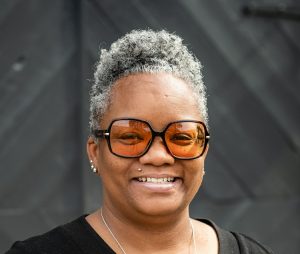person
Tawana Petty

Tawana Petty was a Non-Resident Fellow at the Digital Civil Society Lab (2019-2020, 2020-2021).
Tawana is a mother, social justice organizer, youth advocate, poet, and author. She is intricately involved in water rights advocacy, data and digital privacy education, and racial justice and equity work. She is the National Organizing Director at Data for Black Lives and former Data Justice Program Director at Detroit Community Technology Project and co-leads Our Data Bodies (ODB), a five-person team concerned about the ways our communities’ digital information is collected, stored and shared by government and corporations. Tawana is a convening member of the Detroit Digital Justice Coalition (DDJC) on behalf of DCTP, which organizes Data DiscoTechs (discovering technology) fairs and other initiatives to foster media and digital literacy. She recently co-produced with ODB, the Digital Defense Playbook, a workbook of popular education activities and tools for data justice and data access for equity, as well as the report, A Critical Summary of Detroit’s Project Green Light and Its Greater Context, on Detroit’s Project Green Light surveillance program. Tawana is a co-founder of Riverwise Magazine, a quarterly magazine which lifts up community stories by Detroit residents, which might otherwise be misrepresented or underrepresented in local and national media. Riverwise Magazine recently produced a special surveillance issue, Detroiters Want to Be Seen, Not Watched.
She is a board member of the James and Grace Lee Boggs Center to Nurture Community Leadership (Boggs Center), a Detroit Equity Action Lab (DEAL) Fellow, and the organizer of an annual art festival and artist retreat in historic Idlewild, Michigan, which convenes over 30 artists, organizers, herbalists and innovators each year to create art, share healing practices and respirit each other and the communities they serve.
Tawana is the recipient of several awards, including the Spirit of Detroit Award, the Woman of Substance Award, Women Creating Caring Communities Award, Detroit Awesome Award, University of Michigan Black Law Student Association’s Justice Honoree Award, was recognized as one of Who’s Who in Black Detroit in 2013 and 2015, the Wayne State Center for Peace and Conflict Studies’ Peacemaker Award, and a Certificate of Special Congressional Recognition in 2018.
Research Project
Fellowship Impact
In July, 2021, Detroit organizer Tawana Petty and her colleagues across the state were waiting to hear if the Michigan Supreme Court would rule in favor of allowing the people of Detroit to vote on a new city charter, a “Detroiters Bill of Rights.” Whichever way the court rules, the thousands of hours spent listening, bringing the community together, and creating the plan was worth it. For Petty the organizing and educating built on years of work focused on data justice and centering an understanding that human and community safety takes many forms, but surveillance is not among them. From access to clean water to strong neighborly relationships, from art to broadband, transit to health care, Detroiters continued to care for each other and build together through lockdowns and floods.
Petty credits her time as a DCSL Fellow with allowing her to create materials (like her forthcoming Zine, “Detroiters Know Safety”), curate town halls, be on nationally-organized panels, attend police board meetings, and speak at city council meetings. During this time, she became the National Organizing Director at Data for Black Lives, a role she calls an amplified version of her local work in Detroit. Looking forward she plans to get more rest, continue to make art and organize, and continue asking her two guiding questions: “What time is it on the clock of the world?” and “What does safety mean to you?”
